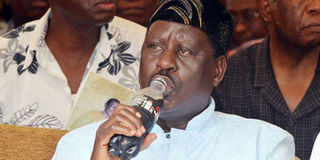US emails tell of Raila plane dilemma

Former Prime Minister Raila Odinga during the burial of the late former Bahari MP Benedict Gunda at Kizingo area, Kilifi County, on October 3, 2015. US diplomats discussed whether to hire a special aircraft for Raila Odinga to use in his bid to mediate peace talks in Ivory Coast in January, 2011. PHOTO | KEVIN ODIT | NATION MEDIA GROUP
What you need to know:
- Emails from Hillary Clinton published on Wednesday by the US Department of State show that top diplomats discussed the issue at length as Mr Odinga, who was at the time prime minister, prepared to head to Abidjan.
- Although they supported mediation, the US, Economic Community of West African States (Ecowas), United Nations and European Union had all acknowledged that Ouattara was the winner of the election.
- However, Mr Odinga’s appointment was immediately rejected by the Gbagbo side, which termed him partial. He had earlier lambasted Mr Gbagbo and asked him to concede defeat.
US diplomats discussed whether to hire a special aircraft for Raila Odinga to use in his bid to mediate peace talks in Ivory Coast in January, 2011.
Emails from Hillary Clinton published on Wednesday by the US Department of State show that top diplomats discussed the issue at length as Mr Odinga, who was at the time prime minister, prepared to head to Abidjan.
Those involved in the debate were then US Foreign Service officials, Assistant Secretary of State for African Affairs Johnnie Carson, Director of Policy Planning Anne-Marie Slaughter, Cheryl Mills, Counselor and Chief of Staff to Secretary of State Hillary Clinton, US Ambassador to Ethiopia Donald Yamamoto and Assistant Secretary of State for Political Affairs Stephen Mull.
The African Union had appointed Mr Odinga mediator in a conflict in Ivory Coast between former President Laurent Gbagbo and Alassane Ouattara, who had both claimed victory in the November 2010 election, a contest that led to bloodshed.
By the time Mr Odinga was made mediator, more than 200 people had been killed and 14,000 others displaced.
OUATTARA WON
Although they supported mediation, the US, Economic Community of West African States (Ecowas), United Nations and European Union had all acknowledged that Ouattara was the winner of the election.
According to the emails, the crisis in Ivory Coast had become a concern for the US and American envoys had directly been in talks with several African leaders.
The communication between the diplomats shows that Mr Carson favoured one side and Ms Slaughter the other.
In an email dated January 14, 2011, Ms Slaughter discussed with Mr Carson details of the plane, which have been censored.
She said: “If the African Union were to ask us to give Odinga a plane, then we wd (would) be in a different position”.
At one time, Mr Mull wrote that Carson was making a “persuasive case” on the subject even though Ms Slaughter was adamant.
Mr Carson and Ms Slaughter later discussed the matter, but there is no evidence from published emails that they agreed.
NOT IMPARTIAL
Mr Odinga went to Abidjan and Ecowas airlifted him from Nigeria on a special aircraft. It is not known whether the plane had been procured by the US.
However, Mr Odinga’s appointment was immediately rejected by the Gbagbo side, which termed him partial. He had earlier lambasted Mr Gbagbo and asked him to concede defeat.
The emails published this week are part of a decision to periodically publish emails from the US State Department during the time Hillary Clinton was Secretary of State.
Clinton, now a top presidential candidate for the Democratic Party, has been trying to ride out a storm after it emerged that she exclusively used personal email accounts when conducting official business during her tenure as Secretary of State.
Clinton initially argued she did not send classified information using the private accounts.
However, those already published by the State Department have some content redacted, indicating the sensitivity they carried.
In May this year, US District Court Judge Rudolph Contreras ordered the Department to release a timetable within which all the batches of emails will be made public between June and early 2016.





